一般将来时结构及练习
一般将来时态及配套练习
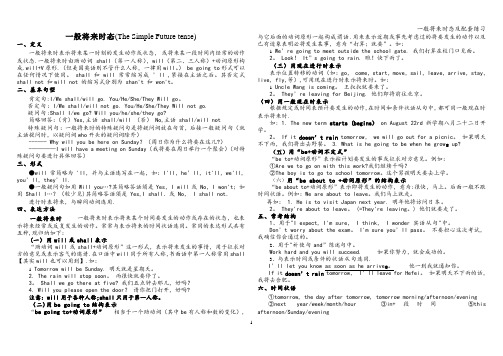
一般将来时态及配套练习一般将来时态(The Simple Future tense)一、定义一般将来时表示将来某一时刻的发生动作或状态,或将来某一段时间内经常的动作或状态.一般将来时由助动词 shall(第一人称),will(第二、三人称)+动词原形构成.will+V原形.(但美国英语则不管什么人称,一律用will。
) be going to形式可以在任何情况下使用。
shall 和 will 常常缩写成’ll ,紧接在主语之后。
其否定式shall not 和will not 的缩写式分别为 shan't 和 won't。
二、基本句型肯定句:I/We shall/will go. You/He/She/They Will go。
否定句:I/We shall/will not go. You/He/She/They Will not go.疑问句:Shall I/we go? Will you/he/she/they go?简略回答:(肯)Yes,主语 shall/will (否) No,主语 shall/will not特殊疑问句:一般将来时的特殊疑问句是将疑问词放在句首,后接一般疑问句(就主语提问时,以疑问词who开头的疑问词除外)---—- Why will you be here on Sunday?(周日你为什么将要在这儿?)-————I will have a meeting on Sunday(我将要在周日举行一个聚会)(对特殊疑问句要进行具体回答)三、形式●will 常简略为 'll,并与主语连写在一起,如:I'll,he’ll,it'll,we'll,you’ll,they’ll.●一般疑问句如用W ill you…?其简略答语须是Yes,I will或 No,I won't;如用Shall I…?(较少见)其简略答语须是 Yes,I shall.或 No, I shall not.进行时表将来,与瞬间动词连用.四、表达方法一般将来时一般将来时表示将来某个时间要发生的动作或存在的状态,也表示将来经常或反复发生的动作。
一般将来时练习题及答案学习
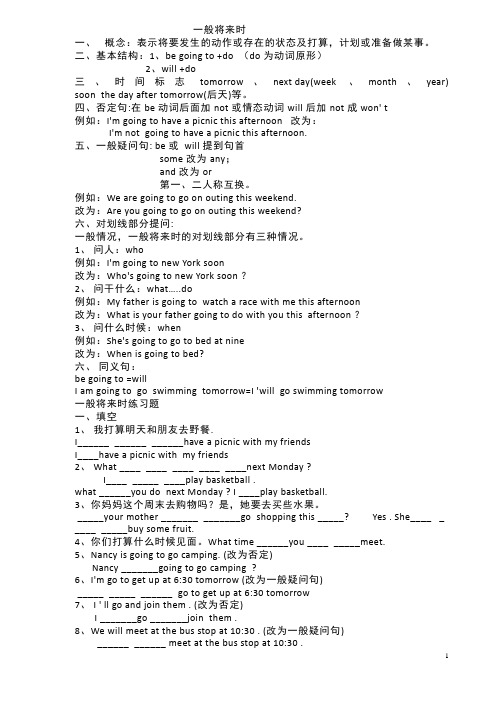
一般将来时一、概念:表示将要发生的动作或存在的状态及打算,计划或准备做某事。
二、基本结构:1、be going to +do (do为动词原形)2、will +do三、时间标志tomorrow、next day(week 、month、year) soon the day after tomorrow(后天)等。
四、否定句:在be动词后面加not或情态动词will后加not成won' t例如:I'm going to have a picnic this afternoon 改为:I'm not going to have a picnic this afternoon.五、一般疑问句: be或 will提到句首some改为any;and改为or第一、二人称互换。
例如:We are going to go on outing this weekend.改为:Are you going to go on outing this weekend?六、对划线部分提问:一般情况,一般将来时的对划线部分有三种情况。
1、问人:who例如:I'm going to new York soon改为:Who's going to new York soon ?2、问干什么:what…..do例如:My father is going to watch a race with me this afternoon改为:What is your father going to do with you this afternoon ?3、问什么时候:when例如:She's going to go to bed at nine改为:When is going to bed?六、同义句:be going to =willI am going to go swimming tomorrow=I 'will go swimming tomorrow一般将来时练习题一、填空1、我打算明天和朋友去野餐.I______ ______ ______have a picnic with my friendsI____have a picnic with my friends2、 What ____ ____ ____ ____ ____next Monday ?I____ _____ ____play basketball .what ______you do next Monday ? I ____play basketball.3、你妈妈这个周末去购物吗?是,她要去买些水果。
一般将来时讲解及练习六年级

一般将来时标志词:tomorrow,thedayaftertomorrow,nextweek,intwoyears,soon,threedayslater等结构一:willwill可用于所有人称,shall只用于第一人称I和we肯定形式:主+willdo一般疑问:will+主+do否定形式:主+won’tdo特殊疑问:what/when/where/which+will+主+doeg:1.we knowtheresultsoon.我们很快就会知道结果了;2.we knowtheresultsoon.我们不会很快就知道结果的;3. we knowtheresultsoon.我们将会很快就知道结果吗4. weknowtheresult.我们将在什么时候知道结果结构二:begoingto肯定形式:主+begoingto+do一般疑问:be+主+goingto+do否定形式:主+benotgoingto+do特殊疑问:what/when等+be+主+goingto+doeg:skyisfullofblackclouds.Itto .快要下雨了;2.ButIthinkit rain.但我觉得它不会下雨;3.it soon很快就会下雨了吗4. you to tomorrow明天你要干什么小小区别:通常情况下will和begoingto能互换will,shall多习惯用于表示是否愿意,第一人称作主语的疑问句一般用shall不用willbegoingto则多用于表示根据迹象判断将要发生某事,或者计划打算要做的事eg:1.youdrivetoschooltomorrowwemeetat8:00tomorrowattheblackcloudsIt rain.readsomebookinthelibrarythisafternoon.用现在进行时bedoing表示将来时:go,come,leave,arrive等表示位置转移的动词eg:1.UncleWang come.王叔叔就要来了;2.They leaveforBeijing.他们即将前往北京;一般将来时练习一.连词成句并按要求改变句式注意动词的正确形式1、children,at,study,home,will,on,computer,inthefuture肯定陈述句:一般疑问句:2、back,they,month,later,a,get,will肯定陈述句:否定句:一般疑问句:3、he,is,going,a,to,patty,evening,this肯定陈述句:否定句:一般疑问句:特殊疑问句问时间:4. China is a modern and strong country.in twenty years5. Do you study hardfrom now on二、用括号中词的适当形式填空1、Thebus come.Pleasewaitforaminute.2、Guangzhou 将会morebueatifulYes,3、Howyou spentyouwinterholiday4、Peoplehavelessworktodointhefuture.5、we goouttomorrowifit rain三、选择正确的答案1. Thereanimportantmeetingnextweek.A.willbeB.willhaveC.willhasD.willgoingtobe2. toEnglandtomorrow.A.flyB.flewC.isflyingD.flies3. Marywillcomebackfiveo’ter4. yougototheparktomorrowA.WillB.ShallC.DoD.Are5. . The day after tomorrow they ________ a volleyball match.A. will watchingB. watchesC. is watchingD. is going to watch6. .There ________ a birthday party this Sunday.A. shall beB. will beC. shall going to beD. will going to be7. They ________ an English evening next Sunday.A. are havingB. are going to haveC. will havingD. is going to have8. ________ you ________ free next Sunday A. Will; areB. Will; be C. Do; be D. Are; be9. He ________ there at ten tomorrow morning. A. willB. Is C. will beD. be10. ________ your brother ________ a magazine from the libraryA. Are; going to borrowB. Is; going to borrowC. Will; borrowsD. Are; going to borrows作业:一、单项选择;1. There __________ a meeting tomorrow afternoon.A. will be going toB. will going to beC. is going to beD. will go to be2. Charlie ________ here next month.A. isn’t workingB. doesn’t workingC. isn’t going to workingD. won’t work3. He ________ very busy this week, he ________ free next week.A. will be; isB. is; isC. will be; will beD. is; will be4. There ________ a dolphin show in the zoo tomorrow evening.A. wasB. is going to haveC. will haveD. is going to be5.–________ you ________ free tomorrow – No. I ________ free the day after tomorrow.A. Are; going to; willB. Are; going to be; willC. Are; going to; will beD. Are; going to be; will be6. Mother ________ me a nice present on my next birthday.A. will givesB. will giveC. givesD. give7. – Shall I buy a cup of tea for you–________. 不,不要;A. No, you won’t.B. No, you aren’. No, please don’t.D. No, please.8. – Where is the morning paper – I ________ if for you at once.A. getB. am gettingC. to getD. will get二、动词填空;1. I ______leavein a minute. I ______finishall my work before I ______ leave.2. —How long _____ you _____studyin our country—I _____planto be here for about one more year.—What ______ you ______doafter you ______leavehere—I ______returnhome and ______geta job.3. I ______betired. I ______goto bed early tonight.4. Mary’s birthday is next Monday, her mother _____giveher a present.三、句型转换;1. People in the north often go skating in winter. next winter2. There are two cinemas in that town. next year3. He comes back late.in two days4.She is a conductor of a train.soon。
一般将来时讲解与练习
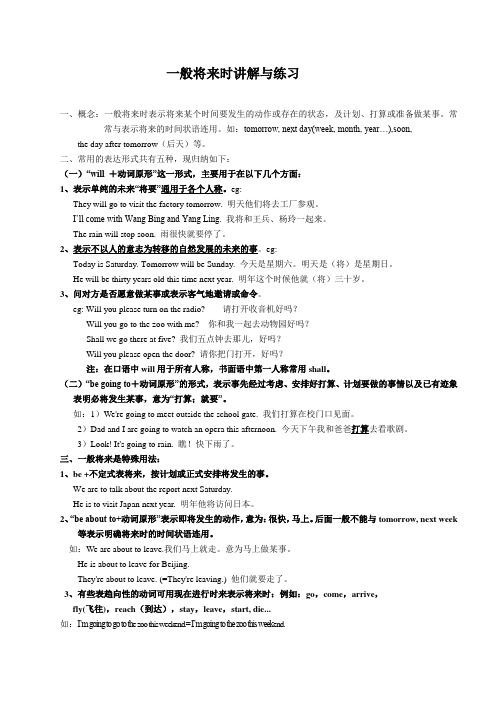
一般将来时讲解与练习一、概念:一般将来时表示将来某个时间要发生的动作或存在的状态,及计划、打算或准备做某事。
常常与表示将来的时间状语连用。
如:tomorrow, next day(week, month, year…),soon, the day after tomorrow(后天)等。
二、常用的表达形式共有五种,现归纳如下:(一)“will+动词原形”这一形式,主要用于在以下几个方面:1、表示单纯的未来“将要”通用于各个人称。
eg:They will go to visit the factory tomorrow. 明天他们将去工厂参观。
I’ll come with Wang Bing and Yang Ling. 我将和王兵、杨玲一起来。
The rain will stop soon. 雨很快就要停了。
2、表示不以人的意志为转移的自然发展的未来的事。
eg:Today is Saturday. Tomorrow will be Sunday. 今天是星期六。
明天是(将)是星期日。
He will be thirty years old this time next year. 明年这个时候他就(将)三十岁。
3、问对方是否愿意做某事或表示客气地邀请或命令。
eg: Will you please turn on the radio? 请打开收音机好吗?Will you go to the zoo with me? 你和我一起去动物园好吗?Shall we go there at five? 我们五点钟去那儿,好吗?Will you please open the door? 请你把门打开,好吗?注:在口语中will用于所有人称,书面语中第一人称常用shall。
(二)“be going to+动词原形”的形式,表示事先经过考虑、安排好打算、计划要做的事情以及已有迹象表明必将发生某事,意为“打算;就要”。
初中一般将来时讲解练习及答案

一般将来时1.结构:谓语动词用“will + 动词原形”或“be (am / is / are) going to + 动词原形”We are going to have a meeting today.We will have a meeting today.I will go to school tomorrow.I am going to go to school tomorrow.He will leave our school next year.He is going to leave our school next year.一般将来时的标志:tomorrow, the day after tomorrow, next (week, year, month…)in 3 days, 2 days later, soon.1.用be going to do表示将来:主要意义,一是表示“意图”,即打算在最近的将来或将来实行某事。
Are you going to post that letter?How long is he going to stay here?I am going to book a ticket.另一意义是表示“预见”,即现在已有迹象表明将要发生或即将发生某种情况。
It’s going to rain.George is putting on weight; he is going to be quite fat.2.用will/ shall do表示将来:(注明shall主要用于第一人称I, we) 一是表示预见You will feel better after taking this medicine.Do you think it will rain?二是表示意图.I will not lend the book to you.Take it easy,I will not do it any longer.基本结构:She will come to have class tomorrow.Will she come to have class tomorrow?Sh e won’t come to have class tomorrow.What will she do tomorrow?肯定形式:①am/is/are going to + do;②will/shall + do.否定形式:①am/is/are going not to + do;②will/shall not + do.3. 用be doing表示将来:主要意义是表示按计划、安排即将发生的动作,常用于位置转移的动词。
一般将来时 基本结构 解析和习题及答案 初中英语
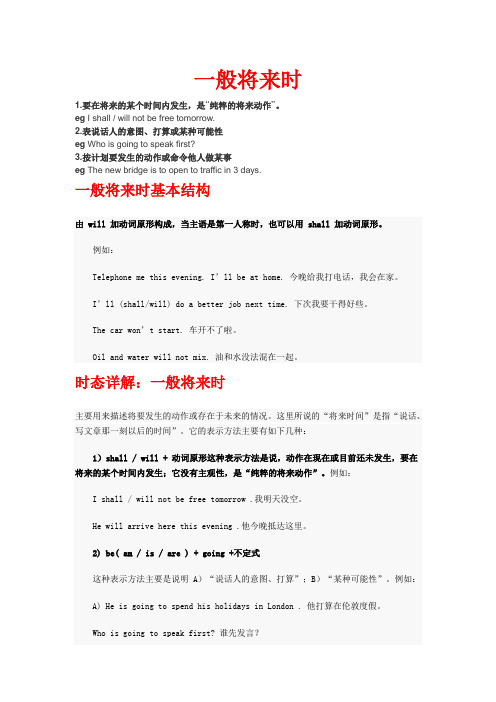
一般将来时1.要在将来的某个时间内发生,是“纯粹的将来动作”。
eg I shall / will not be free tomorrow.2.表说话人的意图、打算或某种可能性eg Who is going to speak first?3.按计划要发生的动作或命令他人做某事eg The new bridge is to open to traffic in 3 days.一般将来时基本结构由 will 加动词原形构成,当主语是第一人称时,也可以用 shall 加动词原形。
例如:Telephone me this evening. I’ll be at home. 今晚给我打电话,我会在家。
I’ll (shall/will) do a better job next time. 下次我要干得好些。
The car won’t start. 车开不了啦。
Oil and water will not mix. 油和水没法混在一起。
时态详解:一般将来时主要用来描述将要发生的动作或存在于未来的情况。
这里所说的“将来时间”是指“说话、写文章那一刻以后的时间”。
它的表示方法主要有如下几种:1)shall / will + 动词原形这种表示方法是说,动作在现在或目前还未发生,要在将来的某个时间内发生;它没有主观性,是“纯粹的将来动作”。
例如:I shall / will not be free tomorrow .我明天没空。
He will arrive here this evening .他今晚抵达这里。
2) be( am / is / are ) + going +不定式这种表示方法主要是说明 A)“说话人的意图、打算”;B)“某种可能性”。
例如:A) He is going to spend his holidays in London . 他打算在伦敦度假。
Who is going to speak first? 谁先发言?B) It is going to rain soon .马上要下雨了。
一般将来时讲解(附习题+答案)

一般将来时讲解(附习题+答案)一、一般将来时的含义:表示动作发生在将来二、一般将来时的句型:(1) will/shall+动词原形(2) be going to+动词原形三、一般将来时的时间状语:tomorrow(明天)、the day after tomorrow(后天)、next...(下一...): next week(下一周)、next year(明年)、next month(下个月)in+一段时间(...之后): in three days(三天之后)、in the future在未来this evening(今天晚上)四、一般将来时的句型结构:(1) will/shall+动词原形(will not =won’t)(will 各种人称均可用,shall 只能用于第一人称)1)肯定句:主语+will/shall+动词原型...如:I will go to school tomorrow.我明天将会去学校He will go to school tomorrow.他明天将会去学校。
2)否定句:主语+will/shall+not+动词原型...如:I won’t go to school tomorrow.我明天将不会去学校。
He won’t go to school tomorrow.他明天将不会去学校。
3)一般疑问句:Will/Shall +主语+动词原型...如:Will you go to school tomorrow?你明天要去学校吗?Will he go to school tomorrow?他明天要去学校吗?肯定回答:Yes, 主语+will.如:Yes, I will.Yes, he will.否定回答:No,主语+will+not.如:No, I won’t.No, he won’t.4) 特殊疑问句:特殊疑问词+will/shall+主语+动词原型...如:What will you do tomorrow?你明天将会做什么?What will he do tomorrow?他明天将会做什么?(2) be going to+动词原形1)肯定句:主语+be going to +动词原型...如:I am going to buy some books tomorrow.我明天打算去买一些书。
一般将来时练习题
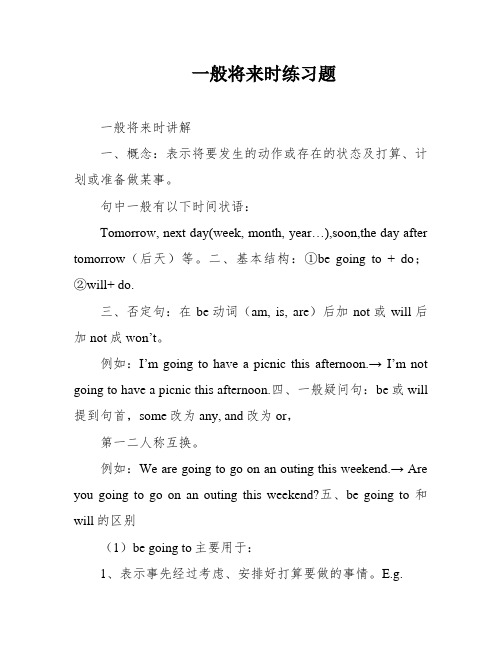
一般将来时练习题一般将来时讲解一、概念:表示将要发生的动作或存在的状态及打算、计划或准备做某事。
句中一般有以下时间状语:Tomorrow, next day(week, month, year…),soon,the day after tomorrow(后天)等。
二、基本结构:①be going to + do;②will+ do.三、否定句:在be动词(am, is, are)后加not或will后加not成won’t。
例如:I’m going to have a picnic this afternoon.→ I’m not going to have a picnic this afternoon.四、一般疑问句:be或will 提到句首,some改为any, and改为or,第一二人称互换。
例如:We are going to go on an outing this weekend.→ Are you going to go on an outing this weekend?五、be going to和will的区别(1)be going to主要用于:1、表示事先经过考虑、安排好打算要做的事情。
E.g.What are you going to do today?今天你们打算做什么Dad and I are going to see a Beijing opera this afternoon.今天下午我和爸爸打算去看京剧2、透露表现按照现在某种迹象判别,某事十分有大概产生。
E.g.Look! There come the dark clouds. It is going to rain.瞧!乌云麋集,天要下雨。
I am afraid I am going to have a cold.恐怕我要患重感冒。
(2) will主要用于在以下几个方面:1、透露表现纯真的未来“将要”通用各小我称。
- 1、下载文档前请自行甄别文档内容的完整性,平台不提供额外的编辑、内容补充、找答案等附加服务。
- 2、"仅部分预览"的文档,不可在线预览部分如存在完整性等问题,可反馈申请退款(可完整预览的文档不适用该条件!)。
- 3、如文档侵犯您的权益,请联系客服反馈,我们会尽快为您处理(人工客服工作时间:9:00-18:30)。
一般将来时结构及专项练习
现在看将要发生的动作或存在的状态.
标志性词语:
tomorrow,soon,next year / week / month, in a few days, in the future, this afternoon, the day after tomorrow, one hour later, tomorrow morning
基本结构:(will/shall +do)
肯定式:主语+will/shall+动词原形+……
否定式:主语+will/shall+ not+动词原形+……
一般疑问式:Will/Shall+主语+动词原形+……?
肯定回答:Yes, 主语+will/shall
否定回答: No, 主语+won’t/shan’t
特殊疑问句:特殊疑问词+will/shall+主语+动词原形+……?
其他表将来时结构:
I. be going to+动词原形(表打算,预测) 表示现在的意图,即打算在最近或不久的将来做某事eg:We are going to ask him
表示现在已有迹象表明即将収生某事eg: Look, it is going to rain
II. 现在进行时(come, go, arrive, leave, start, move) 表示按计划或安排要发生的事eg: We’re having a party next week
课堂练习
1. There _______ a meeting tomorrow afternoon.
A. will be going to
B. will going to be
C.is going to be
D. will go to be
2. Mike _________here next month.
A. isn’t work
B. doesn’t working
C. isn’t going to working
D. won’t work
3. He _____very busy this week, he ______free next week.
A. is, will
B. will, is
C.is, will be
D.is ,is
4. Mother ___ me a nice present on my next birthday.
A. gives
B. are going to give
C. give
D. will give
5. He _______ her a beautiful hat on her next birthday.
A. gives
B. will giving
C.is going to give
D. gave
6. He ___ in three days.
A. came back
B. will come back
C.is going to coming back
D. will coming back
7. The day after tomorrow, we ____ a football match.
A. will watch
B.is going to watch
C. watches
D. will watching
8. They ____ an English party next Sunday.
A. are going to have
B.is going to have
C. will having
D. having
9. ____ you _____ free next Monday?
A. Are, be
B. Will, be
C. Do, be
D. Will, are
10. I _____ for Tibet next Wednesday.
A.am leaving
B. will leaving
C. leaves
D.is going to leaving
句型转换
(1).The girls are going to take acting lessons.(改为否定句)
(2).The students have a school trip in spring.(用next week 改写)
(3).They are going to meet outside the school gate.(划线提问)
改错:找出每句中的错误,在题后改正
1. He will sing and dances for us tomorrow.
2. — Are you going to swim? —Yes, I will.
3. He will help Jim with his English every day.
4. Will her sister sings a song for me tomorrow?
5. They willn’t plant trees next week.
6. Are they going to plays basketball tomorrow?
7. Will we going to visit the factory tomorrow?
8. Paul will be going to make dumplings for Emma.
9. —Are the boys going to the Great Wall next month? —Yes, they will.
综合训练
Jim is going to play football tomorrow.
否定句:
一般疑问句:
肯定/否定回答:
画线部分提问:Who is going to …?
What is Jim going to do …?
Mary will clean the windows next week.
否定句:
一般疑问句:
肯定/否定回答:
画线部分提问:
巩固提升
用所给动词的适当形式填空
1. I ______(leave)right now. I______(finish)my work before I leave.
2. How long ______ you ______(study)in our country?
3. I ______(plan)to be here for about one more year.
4. I ______(hope)to visit the other parts of your country.
5. What ______you ______(do)after you leave here?
6. I ______(return)home and ______(get)a job next year.
7. I ______(be)tired. I ______(go)to bed early tonight.
8. Mary's birthday is next Monday, her mother ______(give)her a present.
9. It is very cold these days. It ______(snow)soon.
10 —______you ______(be)here this Saturday?
—No. I ______(visit)my teacher.
11. I am afraid there ______(be)a meeting this afternoon. I can't join you.
12. Mike won’t believe_____(believe, not)this until he sees it with his own eyes.
13. Most of us don't think their team __will win____(win).。
